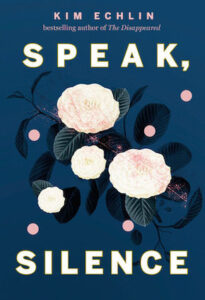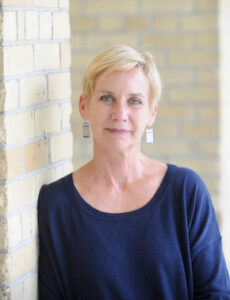Bearing witness
by Brett Marie
“Speak, Silence ushers us into a community of women who guide us with sensitivity, clarity and love through their resistance to being stereotyped as victims.” Ellen Elias-Bursać
Before discussing the far-reaching scope of Kim Echlin’s Speak, Silence, and the enormity of the issues it illuminates, let’s zoom in close: amid a tryst in a hotel room at The Hague one evening, a female reporter covering the trial of a Bosnian war criminal prods her companion, the Dutch guard assigned to watch over the defendant in court, about how the accused, charged with multiple rapes, behaves in detention.
Lieven said, You do not have to worry about what they do. He put his hands around my waist and I asked, But does he talk with no one?
He likes to smoke… Your friend does little, Goat, lies on his bed. He is a woesteling.
What’s that?
A criminal, you know, like a low form of man, a beast.
The narrator Gota presses him further about the trial, during which the civilian women whom Dragić the defendant raped and abused have had to come face to face with him to give testimony. Lieven fields Gota’s questions patiently as she wonders aloud “how a man could want to hurt a woman with his own body in this way.” A few lines later, though, he calls time.
Are you tired of talking yet?
Yes.
Is this okay? he asked as he unbuttoned my blouse.
Yes.
In two short lines of dialogue, casually but gently, Lieven asks for Gota’s consent to proceed. It’s a minor gesture, but the question asked politely stands in stark contrast to the actions of Dragić, and so many other men in the novel, who have taken what they pleased from women by brutal force.
Before the reader can feel too much relief though, before we can turn him into some kind of hero for showing merely the most basic form of decency, almost in his next breath Lieven comes up short.
He said, Your questions are sad and strange.
Lieven is a minor character. He appears late in the book, offers Gota the comfort of physical intimacy while she’s far from home, and does little more. Compared to Gota’s lover Kosmos, the playwright who fathered her child years before, he means nothing. But Lieven’s role in this one scene speaks volumes to this reader.
I find Lieven’s lack of empathy dismaying after having spent a hundred and fifty pages following Gota across a landscape strewn with bodies, dead and living, that have been laid waste by war. But it bothers me more to consider how my reactions to questions about war crimes would have aligned with Lieven’s before Echlin’s narrative set me straight.
The war in Bosnia, and the war crimes tribunal that takes up much of Speak, Silence, are a gaping hole in my knowledge of world history. News stories of the day added the term ‘ethnic cleansing’ to my lexicon, but being a teenager at the time, having developed enough moral sense to decide that War Is Bad, I saw no reason to trouble myself with articles and TV segments that would simply bolster the conclusion I’d already reached. For millions like me, living in countries where they could afford not to ponder the subject, the stories of women imprisoned, raped, and then released into new lives of silent shame were sad and strange, and nothing more.
A potent example of the power of written fiction to open hearts and change minds… Great fiction can conduct the heart and mind to beat at the rhythm of the author’s choosing.”
When read from this angle, Speak, Silence is a public service, and a potent example of the power of written fiction to open hearts and change minds when other media fail to get through. Where a documentary film might have brought sights and sounds to my eyes and ears and allowed me to bear witness to the horrors unleashed on an innocent population, it could only bring me as close as a camera could get. A good story, well written, can bring me inside the minds of its players, and force me to focus on their senses, of smell, of touch, and to feel the sensations it describes (a pounding heart, a sharp blow), without the distractions of sound and vision to keep me at arm’s length. Furthermore, fiction carries the freedom to tidy up the often-messy chronology of real events, to reorder them into a sequence the brain can make sense of. It’s for this reason that, for example, a reader who sleeps through a lecture on poverty in nineteenth-century Europe might shed tears, might rage at injustice, upon reading the fate of poor Fantine in Les Misérables, a full century and a half after Victor Hugo created her out of thin air. Great fiction can conduct the heart and mind to beat at the rhythm of the author’s choosing.

Cellist Vedran Smailović among the ruins of the National Library in Sarajevo, 1992. Mikhail Evstafiev/Wikimedia Commons
And at this, Echlin is a maestro. Her every narrative decision, and every choice she makes in vocabulary or syntax, seems designed to give another tug at the heart. Every one of her tricks works. Perhaps the most obvious plot device she uses is the one that draws the reader in, that tried-and-true standby The Love Triangle: the Canadian writer Gota falls in love with Sarajevo native Kosmos while both are living in Paris, years before his country is consumed by war. But Kosmos loves another, the married Edina back home, and leaves Paris abruptly before he can become too attached to Gota (though not before impregnating her with a child who will grow up without ever knowing him). By war’s end, Kosmos is back in Sarajevo, Edina’s husband is lost, and she, her mother, and her daughter have been traded as slaves among the soldiers who overran their town. Before the dust has settled on that war, the international community has set up a tribunal to bring its most villainous criminal actors to some kind of justice. Gota wants to cover the story; Edina, a lawyer, has been gathering victim accounts on which prosecutors plan to build their case. The two women form a bond as they endure the trial that follows, Gota as an observer, and Edina as a participant.
In the run-up to the trial, Gota wanders the former war zone doing field research and begins to confront the scale of the damage wrought. At times Echlin evokes feelings in grand metaphor. “Justice is a long-feathered, cragged old mountain bird,” she tells us early on. “Under its stiff wings lice crawl, laying and hatching in the worn cycle of revenge and fear.” Just as often, she hits her mark with simple, factual narration. Consider Gota’s trip through the Bosnian countryside with a local guide: “After a hairpin curve, Mak pointed to a hill below the road. He said, Seven hundred buried there.” Her prose is haunting yet lyrical, her pace slow and deliberate, and taken as a whole, the book begins to read like a requiem, for both the dead and the living.
But as masterful as Echlin’s prose is, the most powerful segments of the book come in dialogue that could have been lifted, word for word, from a court transcript. When the time comes for Dragić’s victims to testify against him, Echlin wisely sets down her bag of tricks and simply steps aside to let these women speak. The stories they tell, hesitantly at first but ultimately in full, gruesome, heartrending detail, are profoundly cathartic, for the characters as well as the reader.
The #MeToo Movement of the past few years has taught us the importance of allowing women to speak out when violence is committed against them. The tribunals depicted in Speak, Silence preceded that reckoning by almost two decades, but carried with them a similar lesson, for those who cared to hear it. The Hague tribunals ended with a landmark change in international law, making wartime rape a crime not only against individual women but against all people. Speak, Silence, among so much else, is a heartening tribute to that achievement. It’s a shame that so many people, myself included, chose to ignore it as it happened, unwilling to face the sad, strange questions it had raised.
 Kim Echlin is the author of the novels Elephant Winter, Dagmar’s Daughter, The Disappeared, which was nominated for the Scotiabank Giller Prize and won the Barnes & Noble Discover Great New Writers Award for Fiction, and Under the Visible Life. She lives in Toronto. Speak, Silence is published by Hamish Hamilton/Penguin Canada in hardback, eBook and audio download.
Kim Echlin is the author of the novels Elephant Winter, Dagmar’s Daughter, The Disappeared, which was nominated for the Scotiabank Giller Prize and won the Barnes & Noble Discover Great New Writers Award for Fiction, and Under the Visible Life. She lives in Toronto. Speak, Silence is published by Hamish Hamilton/Penguin Canada in hardback, eBook and audio download.
Read more
Buy at bookshop.org
@KimAEchlin
@PenguinCanada
Author portrait © Sara Upshur
 Brett Marie, also known as Mat Treiber, grew up in Montreal with an American father and a British mother and currently lives in Herefordshire. His short stories and other writing have appeared in publications including The New Plains Review, The Impressment Gang, PopMatters and Bookanista, where he is a contributing editor. His debut novel The Upsetter Blog will be released in Autumn 2021 by Owl Canyon Press.
Brett Marie, also known as Mat Treiber, grew up in Montreal with an American father and a British mother and currently lives in Herefordshire. His short stories and other writing have appeared in publications including The New Plains Review, The Impressment Gang, PopMatters and Bookanista, where he is a contributing editor. His debut novel The Upsetter Blog will be released in Autumn 2021 by Owl Canyon Press.
Read more
Facebook: Brett Marie
@brettmarie1979

